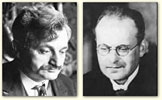Dennis Monokroussos writes:
Last week we looked at the first 34 and a half moves of the game Emanuel Lasker-Aron Nimzowitsch from Zürich 1934. After an extremely dubious opening choice, Lasker’s gritty defense managed to keep Nimzowitsch’s advantage to manageable proportions. The edge remained, but its nature continued to change until we reached the knight ending that constitutes the starting position for this week’s show. Both sides had a knight and three pawns, but Nimzowitsch enjoyed an outside passer – the knight’s worst enemy.

Emanuel Lasker, Aron Nimzowitsch
Even simple-looking knight endings can be very difficult, and this one in particular is very instructive! “Nimzo” offered a virtuoso performance, and there’s much to be learned from Lasker’s play and the analysis as well. Hope to see you all tonight at the usual time (9 pm ET)!
|
Dennis Monokroussos' Radio ChessBase lectures begin on Thursdays at 9 p.m. EDT, which translates to 02:00h GMT, 03:00 Paris/Berlin, 13:00h Sydney (on Tuesday). Other time zones can be found at the bottom of this page. You can use Fritz or any Fritz-compatible program (Shredder, Junior, Tiger, Hiarcs) to follow the lectures, or download a free trial client. |
You can find the exact times for different locations in the world at World Time and Date. Exact times for most larger cities are here. And you can watch older lectures by Dennis Monokroussos offline in the Chess Media System room of Playchess:
Enter the above archive room and click on "Games" to see the lectures. The lectures, which can go for an hour or more, will cost you between one and two ducats. That is the equivalent of 10-20 Euro cents (14-28 US cents).
 Dennis Monokroussos is 40, lives in South Bend, IN, and is an adjunct professor of philosophy at the University of Notre Dame.
Dennis Monokroussos is 40, lives in South Bend, IN, and is an adjunct professor of philosophy at the University of Notre Dame.
He is fairly inactive as a player right now, spending most of his non-philosophy time being a husband and teaching chess. At one time he was one of the strongest juniors in the U.S., but quit for about eight years starting in his early 20s. His highest rating was 2434 USCF, but he has now fallen to the low-mid 2300s – "too much blitz, too little tournament chess", he says.
Dennis has been working as a chess teacher for seven years now, giving lessons to adults and kids both in person and on the internet, worked for a number of years for New York’s Chess In The Schools program, where he was one of the coaches of the 1997-8 US K-8 championship team from the Bronx, and was very active in working with many of CITS’s most talented juniors.
When Dennis Monokroussos presents a game, there are usually two main areas of focus: the opening-to-middlegame transition and the key moments of the middlegame (or endgame, when applicable). With respect to the latter, he attempts to present some serious analysis culled from his best sources (both text and database), which he has checked with his own efforts and then double-checked with his chess software.




















 Dennis Monokroussos is 40, lives in South Bend, IN, and is an adjunct professor of philosophy at the University of Notre Dame.
Dennis Monokroussos is 40, lives in South Bend, IN, and is an adjunct professor of philosophy at the University of Notre Dame.




